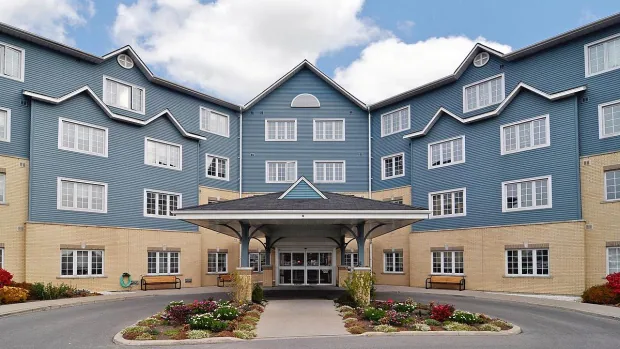Durham police on Wednesday charged an Oshawa man with two counts of unlawful confinement. In February, media reports alleged that door handles at White Cliffe Terrace Retirement Residence in Courtice were removed from the suites of residents who had tested positive for COVID-19.

The general manager of a retirement home in Courtice, Ont., is facing charges after he ordered staff members to remove door handles at some units at the White Cliffe Terrace Retirement Residence in February.
Durham Regional Police Services launched an investigation on Feb. 12 after receiving a complaint against staff members at White Cliffe, which is on Highway 2 in Courtice, about 60 kilometres east of Toronto.
The complaint alleged that during the pandemic, staff removed door handles to some units at the home. Police announced the charges on Wednesday against Tawab Karimi, 40, of Oshawa, Ont. He is charged with two counts of unlawful confinement. He has been released on an undertaking, which means he must fulfil certain conditions and appear in court. Police confirmed to CBC News that Karimi was the general manager at the time of the incident.
According to an exclusive report from CityNews in February, an anonymous employee said a manager at the retirement home ordered maintenance staff to remove door handles on the suites of some residents who had tested positive for COVID-19.
The private retirement home is owned by Verve Senior Living, whose president and CEO confirmed the incident in a statement on Feb. 12, but did not specify why the handles were removed.
“It was a violation of our protocols and practices. As soon as we became aware of the incident, all residents’ door handles were immediately reinstalled,” David Bird said in the statement.
Media reports at the time indicated that the handles were off the doors for several days, trapping residents in their rooms, until a head office employee discovered the situation and complained.
Bird also said in the statement that Karimi was immediately placed on leave from his duties as general manager.
Retirement home authority investigates
At the time, Ontario’s Ministry for Seniors and Accessibility condemned the incident, calling it “completely unacceptable.”
The ministry said they reached out to the Retirement Home Regulatory Authority (RHRA) to ensure “a thorough investigation is conducted.”
The RHRA conducted an inspection of the home on Feb. 4.
The final inspection report dated March 2 states that “the operator of the home failed to protect the residents from abuse. Evidence collected during the inspection revealed the operator removed door handles to confine residents whose plans of care did not include any safety measures.”
Bird said at the time that all handles have since been replaced and an investigation is underway to determine how long residents may have been confined to their rooms.
Outbreak lasted 21 days
“There is absolutely no excuse to remove door handles — ever. We never lock in or prevent the free movement of our residents,” Bird’s February statement said.
As per Durham Region’s COVID-19 data, White Cliffe declared an outbreak on Jan. 15. It was declared over on Feb. 4.
Bird said if a resident was experiencing cognitive impairment and did not fully understand the measures in place to help combat the spread of COVID-19, other protocols would be put in place, such as wander strips, localized safety alarms and stop signs. He said these measures would stop a wandering resident.
The incident means the regulations governing retirement homes need to catch up to those governing long-term care homes, said Dave Hauch, long-term care co-ordinator for the Canadian Union of Public Employees (CUPE).
He adds that whistleblower protection is important, so staff can speak freely and raise an issue without fear of reprisal.
“The current protections allow for us to fight actions of reprisal, but they don’t allow for anonymous complaints,” Hauch said.
“There is an unfortunate culture of fear that exists within the sector, which is why there needs to be clearer protections for staff — and even family members — to come forward.”

